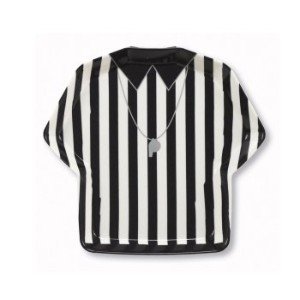
Do you look good in stripes?
Most women shun wearing clothing covered with unattractive lines, yet when they have kids it seems they are forced to don the referee uniform more than they would like. After a while, though, some refuse the task and leave it up to their warring offspring to solve their own disputes.
How often do you allow your children to resolve their own clashes?
Moreover, how often does the technique work?
Personally, I am not opposed to having children resolve issues amongst themselves. However, I think you are kidding yourself if you think young children possess sound conflict resolution skills, and that they will be able to end their battle amicably without dragging you into the drama. After all, kids are immature by nature. They are driven by self-interest, and in most cases, without a referee on hand the more dominant child will resolve things in his favor.
So when is it safe to stop intervening when your kids are at each other’s throats?
According to childhood experts, not until you establish household rules about fighting, provide tools for conflict resolution, and consistently follow through on punishments if your directives are not heeded. After all, teaching children how to treat each other with kindness and respect is not a sibling’s job; it’s a parent’s, and I’m sure you’d agree that you are better at being a mom or dad than your child.
Think about it; is it really fair to expect your 9-year-old son to say to his 6-year-old brother: “Okay, let’s try to work this out calmly. You are my sibling and I need to think of your needs, not just my own. Tell you what; you play with those Legos for as long as you want and I’ll go read a book or something. After all, you are younger than me and I should be the one to sacrifice, not you. Listen, I was six once and I know how you feel.”
If you have a child that would say anything like that, then you might consider letting him work out issues amongst his siblings. In fact, you may want to get him an agent, so he can make money running workshops on conflict resolution.
In the real world, a child’s self-love is stronger than love for a sibling. It’s only with time and guidance that youngsters will learn how to solve problems themselves. In the meantime, put those referee stripes to good use by teaching your kids to treat others the same way they’d want to be treated.
Related Articles:
Discipline: Playing the Guessing Game
Do You Discipline Your Child in Public?
Do You Punish Your Kids For Swearing?
Do Your Kids Need a Manners Makeover?

